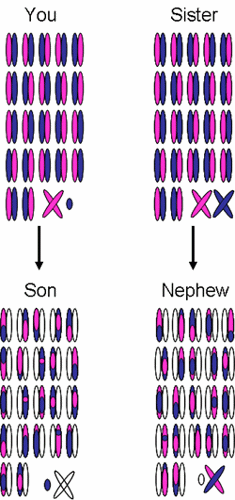
Would my son inherit DNA from his paternal grandmother? Or do I only pass on my Y chromosome?
August 1, 2012

- Related Topics:
- Relatedness,
- Recombination,
- Y chromosome,
- DNA basics
A curious adult from New York asks:
"I am a male. Does my son inherit any genetic material from my mother? Or do I only pass on my Y chromosome (inherited from father intact)?"
You pass a lot of genetic material from your mom to your son. Not as much as your sister would probably pass to her son. But pretty close to the same amount.
The reason for this is that you have more DNA than a just Y chromosome. In fact, you have 45 other chromosomes, 23 of which came from your mother.
You passed some of each of 22 of these chromosomes to your son. So there is a whole lot of your mother in your son.
The one chromosome from your mom that you didn’t pass to your son was the X. Since you had a son, you passed your Y instead. And you’re right that the Y passes pretty much from father to son intact.
But like I said, the X and the Y chromosomes are just one bit of our DNA. The rest was pretty evenly split between your mom and your dad.
More of Your Mom in Your Daughter
As I said, your sister’s son would have, on average, a bit more of your mom’s DNA than would your son. The same would be true of your daughter.
This is because of the X and Y chromosomes. And something called recombination.
I have shown what happens when you have a son or a daughter in the image to the right.

Each set of two ovals is a pair of chromosomes. The pink ones are your mom’s and the blue ones your dad’s.
I’ve drawn the X chromosome to look like an X to distinguish it from the others. It actually looks just like any other chromosome. And I’ve made the Y a tiny little thing like it is in real life.
The first thing to notice is that you got one chromosome from each pair from your mom and the matching one from your dad. This is why you have a mix of blue and pink chromosomes. Note you got your dad’s Y because you are male.
Looking at your kids, you see a whole lot of pink. This is chromosomal DNA from your mom. Both sons and daughters get lots of DNA from their paternal grandmother.
(I am only showing the one of each pair that your kids inherit from you. Remember that they also each get another set of matching chromosomes from their mother.)
What you can also see is that your kids didn’t get any whole pink or blue chromosomes from you. Instead, they got a mix of the pink and blue ones. This process of mixing and matching DNA is called recombination.
What you might also notice is that the one set of chromosomes that does not mix and match is the X and the Y. Chromosomes have to be pretty similar to recombine and the X and the Y are just too different.
This is why you pass a Y pretty much unchanged from your dad to your son. And why the X you got from your mom is passed pretty much intact to your daughter.
This X chromosome is why your daughter has a bit more of your mom’s DNA than does your son. She got your mom’s X…all of your son’s X DNA came from his mother.
Now I don’t want you to walk away thinking that the X passes from mother to children unchanged. Because it doesn’t.
A woman has a matched pair of X chromosomes, one from mom and one from dad. As you’ll see in the next example, these are similar enough to recombine.
More of Your Mom in Your Nephew
Now let’s compare your sister’s son to your son. I have shown what happens in the image on the right.

This time I have left off the grandparents to simplify the image. Remember, the pink ones are from your mom and the blue ones from your dad. I have also included the other parent’s DNA so it is more obvious that your sister’s child is a boy.
As you can see, there isn’t a whole lot of difference between this figure and the last one. The big difference is your nephew’s X chromosome.
You can see that your nephew has about half of your mother’s X while your son has none of her X. This is why on average your sister’s son has more DNA than your son. Note the on average.
Because recombination is pretty random, you don’t necessarily end up with exactly 50% DNA from one parent and 50% from the other. Sometimes you can get a bit more from one parent than the other.
Because we are talking about such a small difference in the amount of DNA, it only takes a small deviation from 50% to swing the percentages in your son’s favor. He still won’t have any of her X…instead, he’ll just have more of the other 22 chromosomes.
So as you can see, your son has plenty of DNA from your mother. He could easily have more than he got from your father!

Author: Dr. Barry Starr
Barry served as The Tech Geneticist from 2002-2018. He founded Ask-a-Geneticist, answered thousands of questions submitted by people from all around the world, and oversaw and edited all articles published during his tenure. AAG is part of the Stanford at The Tech program, which brings Stanford scientists to The Tech to answer questions for this site, as well as to run science activities with visitors at The Tech Interactive in downtown San Jose.
 Skip Navigation
Skip Navigation
